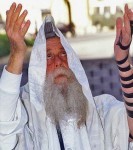Judaism without God
 Sherwin Wine, the rabbi of the atheists, died last week*. He himself did not use the term “atheist”; he preferred to say he was just not sure.
Sherwin Wine, the rabbi of the atheists, died last week*. He himself did not use the term “atheist”; he preferred to say he was just not sure.
I wonder what he had to say about life after death. Believers have a concept of the soul being eternally in the presence of God, but Wine could hardly allow himself that hope. Presumably he believed there was only one life, the one on earth, and when earthly life came to an end, that was that. So we will have no opportunity in Olam HaBa to see whether he is there and to find out whether his views have changed since his sojourn in America.
Maybe there are many other Jews (of the living variety in Olam HaZeh) who are not quite sure about God. We just don’t have the statistics. Not that the figures are even that important. People’s thinking oscillates, and quite a number tend to give God the benefit of the doubt by the time they die.
In any case the fact that so many are preoccupied about God and whether they believe in Him is probably a good sign. They simply wouldn’t bother if they did not have just the glimmer of a thought that maybe the Almighty does exist after all.
Many refuse to believe in Him because they are angry, generally because of the Holocaust. Yet if there is no God, they have no-one to be angry with. Throughout history, from Abraham’s time onwards, Jews have confronted God, shouted at him, and echoed the assertion of some of the survivors, “If God lived in my village, I would break all His windows”. Job tried to sue God and He got a Divine tongue-lashing for his efforts.
In our generation, we have suffered too much for God to give us a piece of His mind. He is more likely to say in the Biblical words, Yadati b’ni yadati – “I know, My child, I know…” He understands when we have problems with Him, but if He were not there we would be bereft, abandoned, lost in a cold, unfeeling world.
I don’t know what Wine did with his anger. I do know that the obituaries said he deleted God from his prayer book, removed the Ark from his synagogue, and relegated the Torah scroll to an archive. He seems to have made man the measure of all things: “Blessed art thou, O man!”. How he coped intellectually I cannot imagine, since man has such a varied record of moral achievement without the steadying hand of God.
I assume that Wine conducted lessons in Jewish history. I would like to know how he managed if he could not acknowledge that God is the central character in the Jewish story and that our history is the record of the ups and downs of the Divine-human covenant.
Above all, what did Wine do with the universal human feeling that there are realms above and beyond the earthbound and the human? How did he handle life’s mystery and mystique, its sense of the transcendent and spiritual?
If his answer was, “I don’t know; I have no view”, how could he call himself a leader, a teacher, a guide? If he said, “I leave it to you to find your own answers”, was it not tantamount to pushing himself out of a job?
A rabbi can argue, but he dare not abdicate. An individual can try to live without God, but Judaism cannot. Nor can a rabbi, however unorthodox he may be.
* This article first appeared on this site in July 2007.



